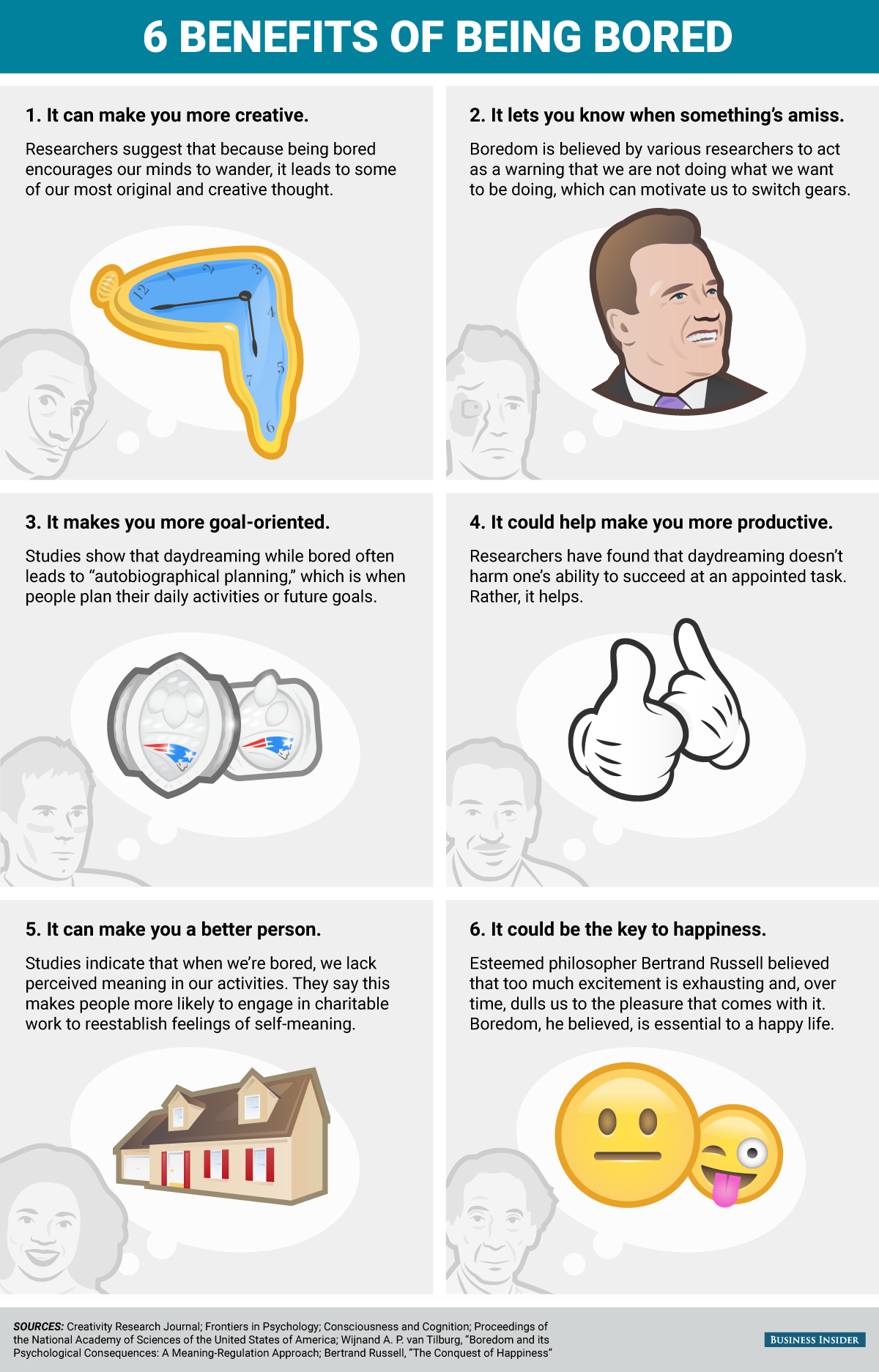
Boredom - it happens to all of us.
Whether we're waiting in line for something, are stuck in traffic, or traveling on a train/plane: Sometimes, we just can't escape those boring life situations where we don't have anything to do.
But surprisingly, there is a lot of scientific background behind boredom, and it's not always as bad as we think: There are different types of boredom, and it even has very positive aspects!
Boredom - What is it?
Boredom is essentially a "lack of stimulus".
Especially nowadays, where everything is so fast-paced and we get fed so much information on a daily basis, only a short time withuot any stimulation can make us feel restless.
Interestingly, humans are the only species that experiences boredom, other animals don't have this urge to do or experience something all the time.
Boredom is an emotion that has been rated similarly to disgust and loathing, and it's especially bad if it happens in a situation where we have no control (like being stuck on a slow train).
And this is how humans react to boredom:
First, we develop an inability to pay attention. Then we often realize how bored we are - which frustrates us even more.
And lastly, we often tend to blame our environment for it.

Types of Boredom
Scientists believed that there were 4 different types of boredom - only recently, a 5th one has been added.
The first four experience boredom in different levels of negativity - with one being the least ond four being the most negative.
1.) Indifferent Boredom:
People who experience indifferent boredom don't really care that they're bored. They're not stimulated - and that's fine to them. The situation doesn't emotionally affect them much.
2.) Calibrating Boredom:
These people are uncertain - they would like to do something else, but don't know what. If there was an alternative presented to them, they'd take it - but they wouldn't actively try to change the situation.
3.) Searching Boredom:
When experiencing searching boredom, people can't sit still - they actively want to search for an alternative and do something else. They often think of what they'd like to do instead, and it frustrates them if they can't because they are unable to change the current situation.
4.) Reactant Boredom:
When people experience this type of boredom, their feelings are exceptionally negative. They're often almost angry or aggressive, and want to escape the situation despite all costs. They would even experience something slightly negative rather than staying bored.
And the new 5th type of boredom is called Apathetic Boredom.
This boredom creates just as many negative feelings as the Reactant Boredom - but the difference is, that the people experiencing it don't have the motivation to change it. It's like their incapable of emotion, they feel bad about the situation but have given up all hope to change it.
This type of boredom has been linked to depression, where people have generally lost all power to fight against an uncomfortable situation.

Positive Effects of Boredom
When we're feeling bored, we are more likely to actively look for something to do: learn something new, view things from a different perspective, or engage with new people.
Studies have shown that boredom leads to more creativity. We want to make the best of the situation and think in different ways to achieve that.
"Boredom is nearly always essential to creativity. It isn't true that creativity is mostly sparked by having a specific problem to be solved. It's far more likely to arise because the person is bored with the way something has been done a thousand times before and wants to try something new. Boredom stimulates the search for better ways to things like nothing else does."-Adrian Savage, Life Coach
And there might be another positive effect of boredom: when we are bored, we often feel like our situation is meaningless, and we want to change that. So this might encourage prosocial behaviour!
This has been studied by Wijnand van Tilburg, scientist from the University of Limerick and co-author of a scientific paper about boredom."Bored people feel that their actions are meaningless and so they are motivated to engage in meaningful behaviour. If prosocial behaviour fulfills this requirement, boredom promotes prosocial behaviour. (...) Boredom makes people long for different and purposeful activities, and as a result they turn towards more challenging and meaningful activities, turning towards what they perceive to be really meaningful in life."-Wijnand van Tilburg, Scientist
How to fight Boredom
Most people tend to choose addictive behaviour as countermeasures against boredom.
Caffeine, overeating, alcohol, drugs and cigarettes are very often just a tool to feel less bored, but can make you end up feeling worse instead!
Of course, finding an activity is the easiest way to fight boredom, but that's easier sai then done because we don't always have the opportunity to do what we want.
Generally, when looking for an engaging activity, we should look for something that provides the perfect mixture of ease and challenge: The task shouldn't be too easy or you'll get bored of it again, and also not too hard otherwise you will get frustrated. When executing it at a perfect mixture, we get into a state called the "flow".
Studies have also shown that meditation was an effective way to deal with boredom, it relaxes the mind and erases negative, stressful feelings.
But like mentioned above, you shouldn't always think about fighting boredom - embracing it and letting your mind wander purposely can produce positive, creative results as well!
So in conclusion: Boredom might sometimes feel negative, but you should try to make the best out of that situation. Let your mind wander, and focus on yourself and your thoughts. Who knows, maybe boredom will help you come up with an amazing idea!
Images: 1, 2, 3, 4, Sources: 1, 2, 3, 4
- Instagram -
© Sirwinchester

